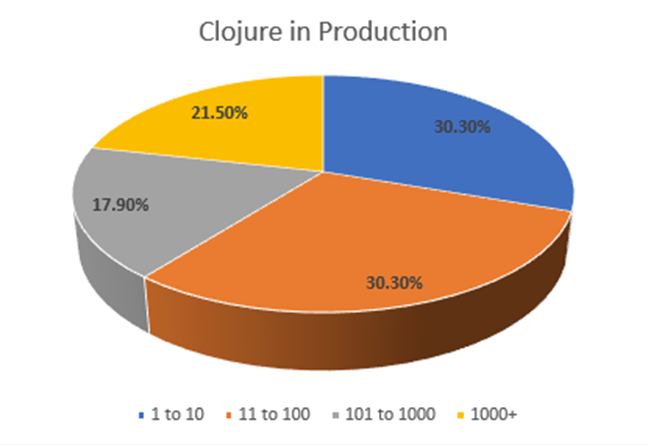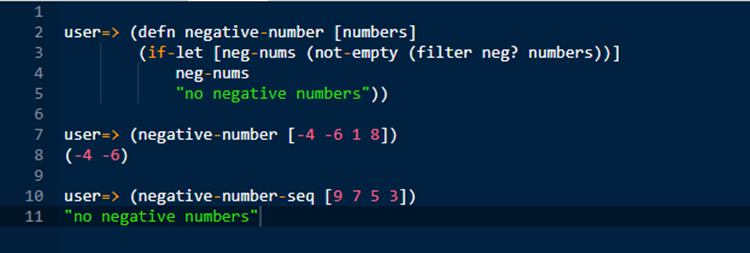According to the 2021 State of Clojure reports, Clojure has seen growth in large companies (i.e., those having 100-1000 employees) and has also been growing in smaller and mid-market companies. Clojure is finding its niche as a professional language. Respondents were asked about the language’s use, and it hit a record percentage high at work, particularly in small teams comprised of one to ten developers.
People are switching from using it for studies, and hobbies, and bringing it to work.

Most poll respondents said they switched to Clojure from the Java programming language. The fact that both languages run on the same virtual machine makes the transition from Java to Clojure much easier. However, many more benefits enable Clojure programmers to be more flexible and agile in their day-to-day work lives when using Clojure.
Functional programming is all the rage right now. Functional programming can be done with object-oriented languages like C# or multi-paradigm languages like Javascript, but there are other languages that are designed to address the functional paradigm, like Clojure.
What is Clojure?
Clojure is a dynamic, general-purpose programming language that blends scripting language approachability and interactive development with an efficient and strong multithreaded architecture. Clojure is a compiled language that remains completely dynamic. At runtime, every Clojure functionality is supported. Clojure provides simple access to Java frameworks, with optional type hints and type inference to ensure that Java calls avoid reflection.
It is a functional variant of the Lisp programming language built for concurrent programmes on the Java platform, and it shares the code-as-data philosophy and a robust macro system with Lisp. But what exactly is the LISP dialect? Clojure programmes are represented by lists in the LISP (List Processing) dialect.

Fig: Sample Clojure code
Since a list in Clojure is surrounded by parenthesis, and a Clojure programme is largely made up of lists, there will be a lot of parentheses. Except for the data structures that represent the programme, there is essentially no syntax in Clojure. As a result, there isn't much to learn, making it relatively easy and syntax-free.
Features of Clojure:
- Simplicity
Clojure programmes are simple to understand and use because they are largely functions and simple data structures (i.e., lists, vectors, maps, and sets). - Dynamic
Clojure is dynamic, which means that Clojure programmes can be interacted with rather than simply compile and run. - Functional Programming
It implements functions as first-class objects, employs immutable data structures, and places a premium on recursive repetition. - Concurrent Programming
Concurrency is the ability to handle numerous tasks at once, such as taking advantage of the capability of multicore CPUs. Concurrency is widely supported in Clojure. - JVM Hosted
It's a LISP dialect for the JVM that allows Clojure to provide the following features:- a strong macro-system
- shares with Lisp the code-as-data philosophy
- REPL environment that works in conjunction with IDEs (Integrated development environments)
- Runtime Polymorphism
Systems that enable runtime polymorphism are easier to adapt and extend, and they can handle various data types with a consistent interface. Clojure enables polymorphism in a variety of ways:- Proxy: It allows Clojure to generate Java Interface implementations.
- Multimethod: Clojure's multimethod system permits dispatching on types, values, properties, and metadata of, and relationships between, one or more parameters, allowing for complex runtime polymorphism.
- Protocols: These are a set of functions that have different implementations for different data types
What iMocha has to offer about JavaScript
iMocha offers the following question types to review candidates’ technical skills and understanding.
- MCQ
A multiple-choice question (MCQ) is made up of two parts: the question or problem, and a set of alternatives or possible answers that include a key, which is the best answer to the question, and a few distractors, which are convincing but incorrect answers to the question. - AI-LogicBoxes
AI-LogicBox is an artificial intelligence-based pseudo coding platform designed to assess programmers’ logical and problem-solving skills. - Coding Questions
iMocha has a wide range of question types to test the candidate's skills with many parameters. While screening for a developer role, you can test the coding skills of the candidate.
How to Hire the Clojure professional for your team
Clojure is well-suited for data mining and processing large datasets, and it empowers developers to identify actionable resources. So, to assist you in hiring Clojure developers, we have created a specialised hiring guide.
Examine this list of essential skills for identifying high-value professionals. Applicants will be tested using the information and interview questions provided in this guide.
Some of the skills to look for in a Clojure developer are:
1. Ability to operate with Java Virtual Machines (JVMs)
2. Strong base in JavaScript
3. Working knowledge of Java Development Kit (JDK)
4. Understanding of several programming languages
5. Strong communication skills
Questions that can be asked in Clojure include:
- For Entry Level Clojure Developer
- What is Clojure REPL?
- What are macros in Clojure?
- What is the Clojure syntax for declaring the operator and operands?
- For Senior Level Clojure Developer
- What characteristics does Socket Server have?
- How do I fetch web pages and make HTTP requests?
Conclusion
Clojure, a general-purpose programming language with an efficient and strong multithreaded infrastructure, has a very lean and well-designed core that assists you in writing maintainable code.
.gif?width=1920&name=CTA%20for%20blog%20(1).gif)

